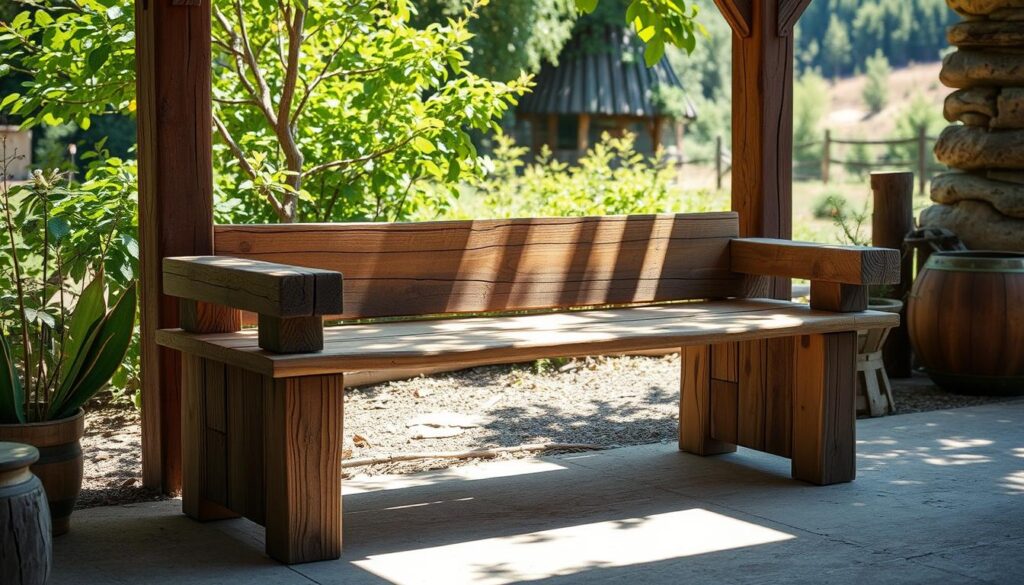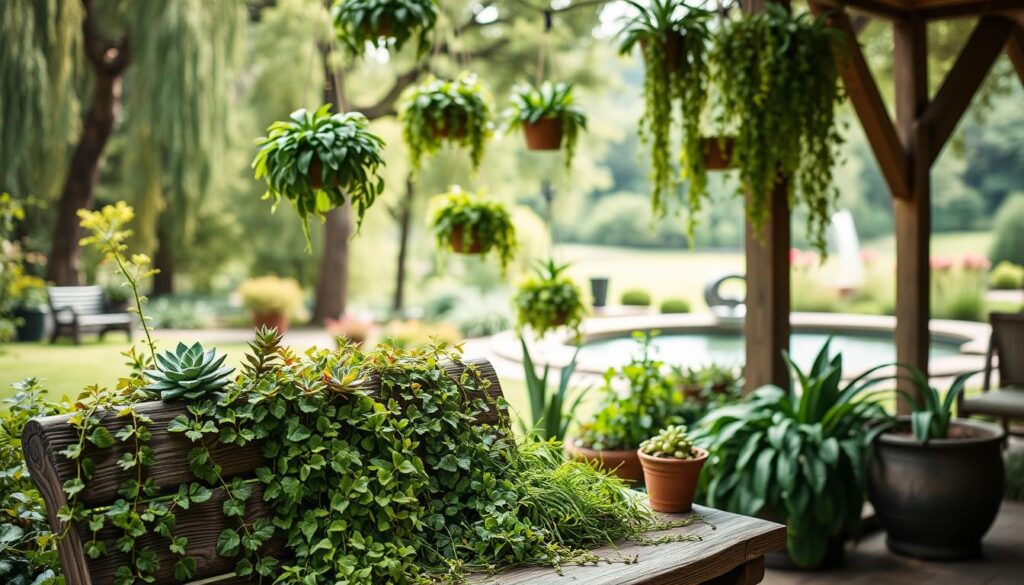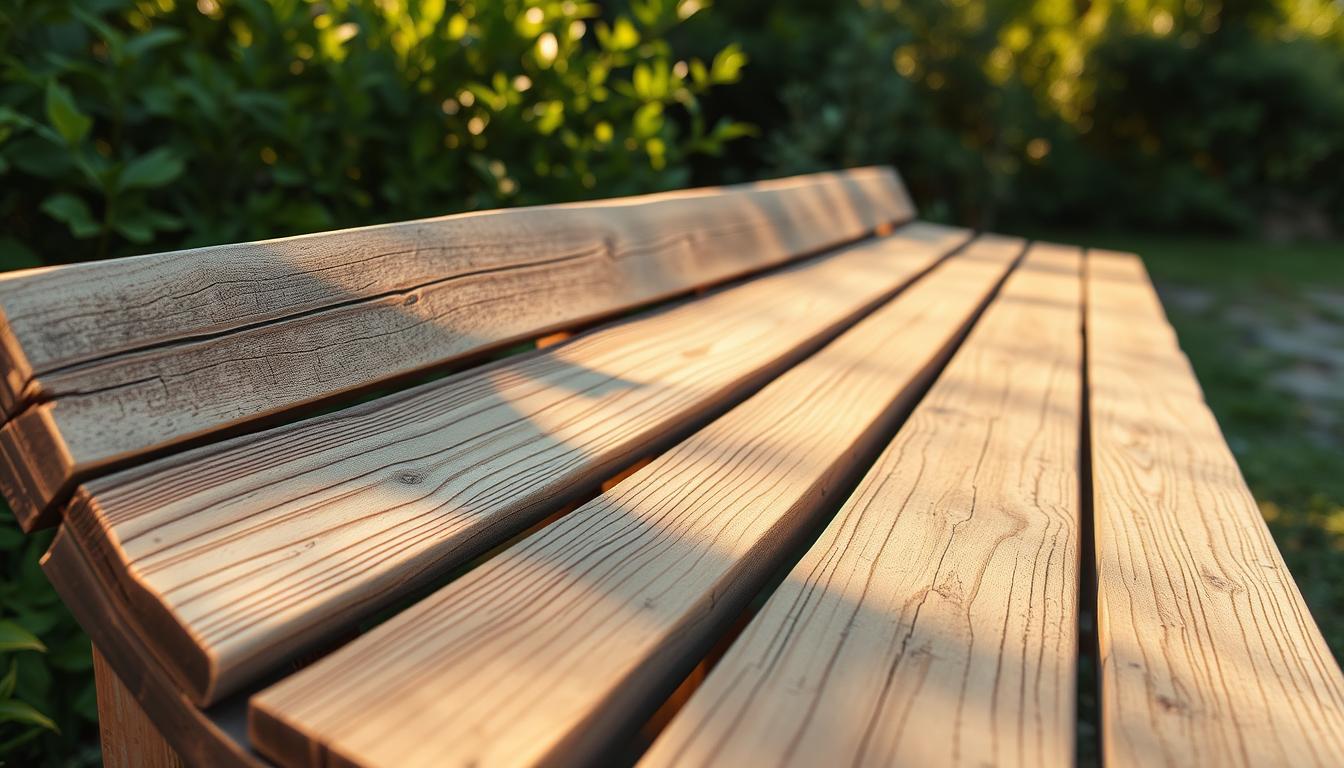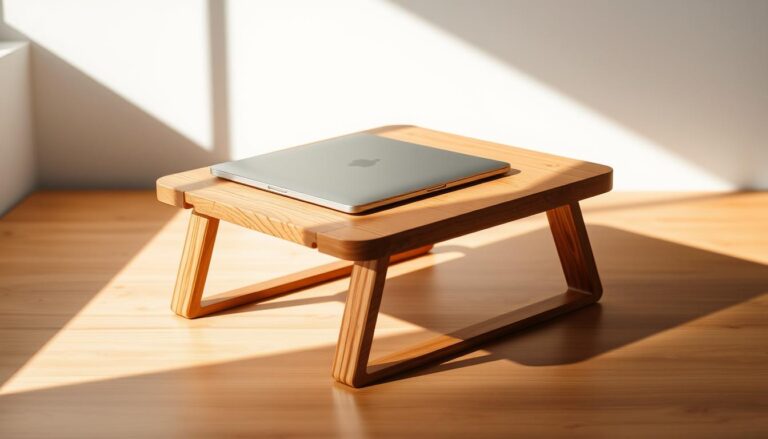Every year, the U.S. alone creates about 22 million tons of wooden furniture waste. This big number shows why we need eco-friendly outdoor seating. Making a bench from recycled wood slats not only helps the planet but also adds beauty to your space. This guide will show you how to build a bench step by step. It focuses on the happiness and pride of using recycled materials. Let’s explore how to make something beautiful and be kind to our earth together.
Introduction to Recycled Slat Benches
Building a bench with recycled slats is a great way to practice sustainable furniture design. Using materials that would otherwise go to waste, you save money and help the environment. A bench made from upcycled wood shows off creativity and turns what might be considered trash into attractive, useful seating.
Benefits of Using Recycled Materials
Choosing recycled materials for your projects offers many advantages. Using things like reclaimed wood cuts down on the energy needed to make new products. This choice supports durability because reclaimed wood has a unique history that new materials can’t match. Benches made this way bring character to any space and reduce your carbon footprint, focusing on green seating.
Environmental Impact of Recycling
Recycling has a big positive impact on our planet. It reduces landfill waste, saves natural resources, and lowers emissions from waste disposal. Using recycled slats for an upcycled wood bench fits with living sustainably, promoting responsible consumption. When you choose recycled materials for furniture, you’re helping to create a healthier environment.
Gathering Your Materials
Making a beautiful bench from recycled slats means choosing your materials wisely. Focusing on eco-friendly garden furniture can not just make your outdoor area look better. It also fits with your eco-friendly lifestyle. When picking your materials, think about the different wood types and what they offer.
What You Need for Your Project
Here’s what you need to build your bench:
- Recycled wood slats, ideally from reclaimed places
- Wood screws to put it all together securely
- Wood glue for extra hold
- Sandpaper to smooth any rough edges
- Sealer or paint for a final touch
Choosing top-quality recycled wood is key. It’s not just good for the planet. It also means your bench will last longer and look great.
Best Sources for Recycled Slats
Finding the right materials might be simpler than you think. Here are some good places to look for recycled slats:
- Local construction sites, often happy to give away what they don’t need
- Recycling centers that have reclaimed wood
- Salvage yards with a focus on reusing materials
- Community exchanges or online marketplaces
Looking in these places supports recycling. It also increases your chance of making something really special and eco-friendly for your garden.
Tools Required for Bench Construction
To build a recycled wood slat bench, you need the right tools. These tools help DIY enthusiasts make beautiful, eco-friendly outdoor seats. These seats can make any garden or patio look better. Here’s a list of essential tools for making your bench. Plus, we suggest safety gear to wear.
Essential Tools for DIY Enthusiasts
- Saw: A circular saw or handsaw will help cut the recycled slats to desired lengths.
- Drill: A power drill is necessary for making holes for screws and fastenings.
- Measuring Tape: Accurate measurements are crucial for achieving the right dimensions.
- Square: This tool ensures that your cuts are straight and angles are precise.
- Level: Use a level to ensure the bench is stable and even when completed.
- Screwdriver: A reliable screwdriver is needed for assembling the parts.
Safety Gear Recommendations
- Protective Eyewear: Always wear safety glasses to protect eyes from sawdust and debris.
- Gloves: Thick gloves can shield hands from sharp edges and splinters.
- Dust Mask: Protect your lungs from sawdust, especially when sanding or cutting.
Preparation of Recycled Slats
Getting your banco com ripas recicladas ready is key. Begin by cleaning and examining your used slats. These steps make a strong base for your work. They boost how long your project lasts and make it look and feel better. Follow these steps to prepare your slats well.
Cleaning and Inspecting the Slats
First, clean each slat well. Getting rid of all dirt, dust, or old paint is important for a good finish. Use soapy water and a brush for tough spots. After cleaning, rinse and dry them fully before examining. At this stage, look for damage like cracks or bends. Remove any slats that seem unsafe or save them for smaller parts of your banco com ripas recicladas.
Tips for Sanding and Smoothing
Next, focus on sanding the cleaned and checked slats. Start with medium-grit sandpaper to smooth out rough spots. Be careful with parts that could easily splinter. A smooth surface makes the bench comfy and safe to use. Then use finer sandpaper for a shiny appearance. Sanding this way reduces splinters, making your banco com ripas recicladas both nice to look at and use.
Designing Your Bench
Making a bench from recycled slats is a fun chance to make eco-friendly furniture. You can make your outdoor area special and show your love for the planet. Think about different designs and sizes to make your bench look great and work well.
Choosing the Right Style
When picking a style for your bench, consider the look of your outdoor space. Here are a few popular styles:
- Traditional: Classic wooden benches with detailed designs are perfect in green, lush gardens.
- Modern: Simple lines and minimal designs give a modern vibe, great for city places.
- Rustic: Old-looking wood and natural finishes add warmth to any outdoor area.
- Contemporary: Using different materials, like metal and wood, gives your garden furniture a unique twist.
Dimensions and Layout Ideas
Choosing the right size for your bench is key for comfort and usefulness. Here are some suggestions:
- The average height for benches is between 16 and 18 inches.
- Widths change, but a good seat is usually 4 to 6 feet wide.
- Think about the placement. A bench facing a garden or patio feels more inviting.
Using these ideas can make your outdoor space better and show your support for eco-friendly design.
Building the Frame
Making a strong frame is key for an upcycled wood bench. It not only holds the bench up but also makes it last longer. There are many tools and ways to do this well and quickly.
Tools and Techniques for Frame Construction
First, get your tools ready. You’ll need things like a circular saw, drill, screws, and a tape measure. Each one has a special job in making sure the bench’s frame is sturdy and right.
- Circular saw: Needed for cutting wood to the right size.
- Drill: Helps make starter holes and stops the wood from splitting.
- Screws: Use wood screws for a strong frame.
With your tools set, begin by marking your frame’s size. Be exact so your bench doesn’t wobble or fall apart later.
Securing the Frame for Stability
For a sturdy bench, securing the frame is crucial. Using corner braces is a top method. They’re metal parts that strengthen the corners and add support.
| Stability Techniques | Effectiveness | Ease of Use |
|---|---|---|
| Corner Braces | High | Easy |
| Diagonal Supports | Medium | Moderate |
| Wood Glue | Medium | Easy |
Using these ways will make your bench’s frame stable and tough. A solid base means your bench can handle different designs and last long.

Attaching the Slats
When you attach slats to your bench frame, it’s key for its lasting use and comfort. Getting the spacing right and choosing the best way to fasten them plays a big part in your project’s success. Doing it properly makes it look good and stops it from sagging later on.
Proper Spacing Techniques
It’s important to space the slats evenly. Here’s how you can do that:
- Use spacers: Wooden or plastic spacers can help keep a uniform gap between slats.
- Leave room for expansion: Allow for seasonal changes by incorporating slight gaps that can accommodate wood expansion.
- Check alignment: Regularly measure the distance between each slat to ensure they are evenly spaced throughout.
Recommended Fastening Methods
Choosing the right fastening method is crucial for your bench’s stability. Here are some top choices:
| Fastening Method | Description | Advantages |
|---|---|---|
| Screws | Connecting slats with screws provides a strong, secure hold. | Durability and ease of disassembly. |
| Wood Glue | A strong adhesive can be used in conjunction with screws for added stability. | Offers a clean appearance without visible fasteners. |
| Brackets | Metal brackets can be used to support slats at the junction with the frame. | Enhanced strength, especially for heavier loads. |
By using these methods, your bench won’t just look great but will also be a cozy place to sit. Each slat adds to the functionality of your eco-friendly seating.
Finishing Touches
When you’re done making your recycled slat bench, it’s time to add a personal touch. This step helps in promoting green living in outdoor decor. Finishing touches turn your bench into both a useful piece and an art piece.
Choosing the right colors and accessories can boost the aesthetic and comfort of your bench. This makes it more than just a place to sit outdoors.
Staining or Painting the Bench
Adding stain or paint does more than just make your bench look good. It also protects it from outdoor elements. Look for eco-friendly stains or paints that are kind to the environment. They offer protection and come in rich colors to match your garden or patio.
Think about these choices for your bench’s finish:
- Natural stains that highlight the wood grain.
- Bright colors to create a cheerful atmosphere.
- Neutral shades for a classic, understated look.
Adding Cushions for Comfort
Cushions can make your recycled slat bench much more comfortable. Using sustainable materials or outdoor fabrics shows you care about green living. Plus, the right cushions can show off your personal style and make seating cozy for everyone.
Keep these tips in mind when picking cushions:
- Opt for waterproof or fade-resistant fabrics.
- Choose colors and patterns that match your outdoor area.
- Pick a thickness that keeps you comfy for longer periods.

Maintenance Tips for Longevity
To keep your recycled slat bench looking good and sturdy, proper care is key. This type of furniture can last a long time, showing that sustainable designs can be both beautiful and durable. Taking care of it not only makes it last longer but also keeps it looking great for years.
Caring for Your Recycled Bench
Cleaning your bench regularly is important to keep it looking its best. Just use mild soap and water to wipe away dirt and grime. Make sure to rinse it well and let it dry fully to avoid moisture damage.
Putting on a weather-resistant finish helps shield the wood from weather wear. Eco-friendly sealants or oils are best since they stick to the idea of being green. You should do this once a year to maintain its appearance.
Seasonal Maintenance Checklist
Changing your care routine with the seasons will better protect your bench. Below is a guide for what to do each season:
| Season | Maintenance Task | Details |
|---|---|---|
| Spring | Inspect for Damage | Check for cracks or loose slats that need repair. |
| Summer | Protect from UV Rays | Apply a UV-protectant finish to reduce fading. |
| Fall | Clean Thoroughly | Remove fallen leaves and debris to prevent mold. |
| Winter | Cover or Store | Consider covering or storing the bench in extreme weather. |
Conclusion and Final Thoughts
Making a bench with recycled slats is not just useful for sitting outside. It also shows your commitment to helping the planet. By following the steps—from getting materials and tools to adding the slats and final touches—your bench becomes an eco-friendly highlight. To keep it looking great, make sure to take care of it well.
Getting into DIY projects can open up many doors. Enjoying your new bench? Think about what else you could do to make your outdoor area better. From making more furniture to creating unique decorations, using recycled items can boost your creativity and promote a green lifestyle. Your adventure in making eco-friendly outdoor furniture can be both fulfilling and enjoyable.
Let your creativity run wild as you think up different designs and uses for recycled stuff. Every project lets you do something good for the environment and make your outdoor area more personal. Happy crafting!




